AVF recently spoke with Tusya Garibashvili, the creative young entrepreneur behind SpaceFarms, who has taken the concept of farming to a new level in Georgia.
We talked about how her idea of shaking up the traditional farming practices in Georgia, has grown into a movement that aims to make agriculture an integral part of urban life and rewrite how we farm, deliver and consume greens in the city.
“I created a job for me and a new generation of farmers.”
– How It Started?
The idea for indoor farming started from growing sprouts and microgreens with a friend in a shed in the back garden. From the get-go I learnt from my mistakes – I sowed the seeds in soil and thought the sprouts were a mistake, so I threw them out and they landed in a patch of soil. They were outside the garage, but I watched them grow into beautiful microgreens.
In 2017, in Georgia, the concept of using growing racks and farming vertically without pesticides was virtually unknown. We started growing five varieties of microgreens, and once I knew we had great, high-quality produce, we went to the chefs, and it was up and running.
Within a year, I wanted to learn more about technology in agriculture and develop this field in Georgia. I started thinking about indoor vertical farming and controlled environment agriculture. This led me to think about the name SpaceFarms. In 2018, I started researching more about indoor farming and I found a story about Aerofarms, who, as I remember, started in a nightclub. It inspired me, and for the first time, I imagined how I could grow leafy greens inside a building.
“In 2018 I started researching more about indoor farming and I found a story about Aerofarms – who started in a nightclub, and it inspired me. And for the first time I imagined how I can grow leafy greens inside a building.”
SpaceFarms X Stamba Hotel
When I met the owner of Hotel Stamba, I shared my vision about growing leafy greens inside the hotel and making the entire process transparent for guests. He liked the idea and understood the value of daily delivering freshly harvested greens without chemicals and pesticides. We then started working on creating the first indoor vertical farm in Georgia inside Hotel Stamba.
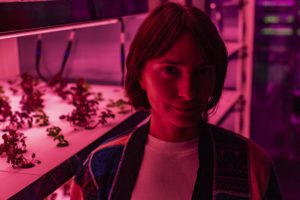 In 2019, we built the first indoor vertical Farm inside the hotel. And it was great because it was transparent with big glass windows, special thermal glass, so the guests and visitors could see how all processes are created. You can see the whole growing cycle from the seedlings through growing racks to harvesting – and of course consuming the produce.
In 2019, we built the first indoor vertical Farm inside the hotel. And it was great because it was transparent with big glass windows, special thermal glass, so the guests and visitors could see how all processes are created. You can see the whole growing cycle from the seedlings through growing racks to harvesting – and of course consuming the produce.
Today, built across 150 square meters with seven levels of racks, SpaceFarms applies 75% less water than traditional farming.
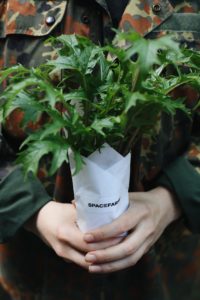
Image Courtesy of SpaceFarms
Using disruptive technologies, we fully control the environment (light intensity, nutrient intake, humidity, carbon dioxide emissions, and temperature) to yield optimal plant growth. We can produce 400 to 450 kilograms per month of leafy greens and 40 kilograms per month of microgreens. Regardless of the season, we are proudly supplying Stamba Hotel restaurants with fresh, delicious, and flavourful produce year-round.
We also collaborate with the agricultural University and the young students or graduating students come by the farm, and they are interested in the new technology and see me and hopefully themselves as a ‘future farmer’.
– What is your technology, and who is it for?
Our Advanced Technology. we specialize in modular farms, branded as SpaceFarms Spots, using advanced technologies. With, Ventilation, systems, we have full control over the environment where micro and leafy greens grow.
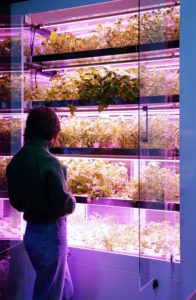
Image Courtesy of SpaceFarms
By managing CO2 emissions, water recycling, nutrient intake, temperature, humidity sensors, and lighting intensity, we create perfect conditions for nurturing fresh, 100% pesticide-free, high-quality produce.
We started from the beginning working with restaurants and cafes, and SpaceFarms Spots will serve and be particularly useful to the HORECA industry, allowing the restaurateurs to grow fresh greens year-round. These crispy and nutritious plants yield truly remarkable culinary experiences. SpaceFarms spots team offers full technical support and a wide range of consultative services to everyone interested in purchasing a modular farm.
– What is unique about your product and approach
We do not want our products cut and sold on the supermarket shelves like some of our competitors. We want chefs to have the freshest produce daily.
At SpaceFarms:
- We know how to do great pest management
- We know how to protect our plants without chemicals
- We know the varieties that always have high demand in Georgia including in winter
- We know our market and our customers and work with them
- If chefs need to change a leafy green variety, then we can adapt.
- Our customers know we have the stability of production/price across the whole year
- Our customers know our produce is high quality and tastes great.
I work with different companies around the world, so I can buy the best quality racks, LED lights, substrates, nutrient, seed etc for optimization of our farm.
– What is the potential of your technology going forward?
SpaceFarms has a new project, Modular Farm Spots. The first prototype holds two square meters and can regularly produce 15-20 kg of crops per month, regardless of the season, year-round. Crops are grown without pesticides or herbicides with minimal human labor and low utility expenses.
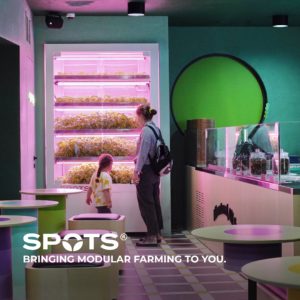
Image Courtesy of SpaceFarms
Having secured two sets of funding from the Georgian Innovation Agency and USAid Agriculture program I created ten small modular farms known as SpaceFarm Spots. I didn’t need to think about where to locate them because people found themselves. Everyone knows the SpaceFarms inside Stampa hotel, so people were happy to install a modular farm from our company.
What are Spots? – modular farms that are operated via a wireless network and controlled remotely 24 hours a day, including components such as temperature, humidity, nutrients, and others. With the help of Spots, plants will grow in a controlled environment without the usage of pesticides or herbicides.
The main goal of Spots is to provide customers with the freshest crops possible without the need for transportation; Growing plants with the best qualities while also caring for the environment by reducing a negative impact is what we endeavour.
Modular farms consume a minimal amount of water and energy. More modular farms in the city mean less transportation of the product and cuts in emissions, which naturally reduces agriculture’s carbon footprint.
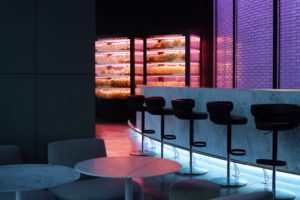
Image courtesy of SpaceFarms
Without marketing, we have 10, almost 11 modular Farms in place already. Every location knows they have a unique marketing proposition with the farm, and a daily harvest of fresh produce that is not too much for their business. The SpaceFarm Spots are popular with hotels and restaurants. So, marketers and chefs are happy to have the modular farm.
We make it easy for people to have a SpaceFarm Spots. It works on a subscription basis. The business does not have to invest a big amount of money to buy or create a big farm. It is easy for people to collaborate with me because they don’t need to worry about growing the seedlings, maintenance, technical aspects or staff because we look after all of that.
We just grow side by side with traditional farmers, we are not trying to replace them. We are helping to produce more leafy greens and microgreens, so we need to import less from outside Georgia. So, together we can do our best for local production. And together we can create a Community to grow locally healthy fresh produce.
– What are your goals in the future?
This business plan is working well. I would like to scale the business. Georgia is a small country with a small population, and we are doing something high-tech that could be scaled in the same type of businesses in Europe and in Asia and in the U.S. The business model I use is very adaptable. In three to five years, it would be great if we go to Spain because it has huge markets, the Emirates of course, because the hospitality industry is growing.
“Our vision with Spots is for urban-grown vegetables, fruits, and herbs to reduce emissions, perishability, runoff, and transportation costs. They enable cities to become more self-sufficient, as opposed to relying only on food grown elsewhere.”
– What are you looking for in the VF space -> kind of collaborators?
I want to continue to build relationships that build relationships to scale my business model.
If you would like to know more about SpaceFarm and its products and possibilities for project cooperation or collaboration, then contact:
Tusya Garibashvili ( tusya@spacefarms.ge)
Instagram https://www.instagram.com/spacefarms.ge/
Web page: https://spacefarms.ge/spots/


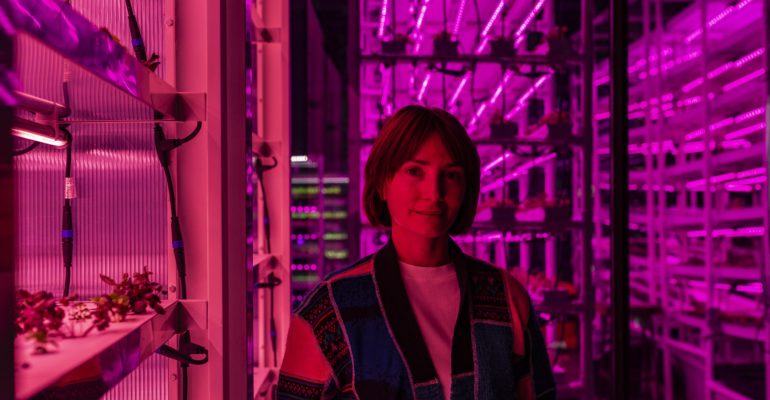
Comments are closed.